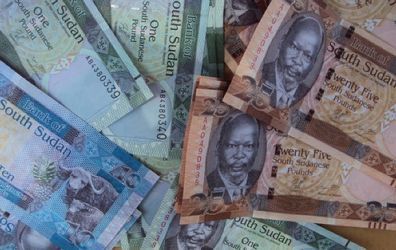South Sudan pound further weakens against US dollars
June 18, 2016 (JUBA) – The United States (US) dollar has further strengthened against the South Sudanese pound (SSP) this week in the ongoing deterioration of the country’s economy.

Multiple sources and residents in a series of sample of interviews on Friday found that 1 US dollar traded at 50SSP at the black market compared to 35SSP to $1 at the Central Bank.
Dollar’s exchange rate started skyrocketing last year following the declaration by the Central Bank of South Sudan that it had floated pound against dollar.
The continued rise of dollar’s exchange rate has led to the increase of prices on basic commodities both in the national capital, Juba, and outside Juba. Currently, a sack of sorghum sells at 3000SSP in towns like Wanyjok in Aweil East state and a bag of maize floor at 1500SSP.
Traders in Juba and other major towns of South Sudan blame the increase of prices on the scarcity of US dollar to import goods items from the neighboring countries as South Sudan depends largely on food imports.
The latest dollar’s exchange rate has prompted citizens to blame President Salva Kiir’s government for being “reluctant” to address the economic meltdown in order to salvage the situation.
Following the formation of the unity government, the two leaders – president Kiir and first vice president, Riek Machar, promised to work together to address the economic hardship, however, their promise never yielded any fruit as there is slow progress in the implementation of the peace deal, including economic reforms.
International community is reluctant to release money that can be injected into the country’s economy, citing lack of political will by the peace partners to implement the urgently needed security and economic sector reforms.
Last week, information minister, Michael Makuei Lueth, in a televised statement on the state-owned South Sudan Broadcasting Corporation (SSBC) publicly admitted that the government is broke and has no money to pay for both public and civil servants.
He called on the civil servants, who have not been paid for three months now, to remain patient as the government tries to find a way to get money, but added that they will not be able to get paid for their past arrears.
Ordinary citizens however said senior government officials who have looted the country and have millions of dollars in their foreign bank accounts do not feel the pain being experienced by the majority poor in the country.
(ST)
